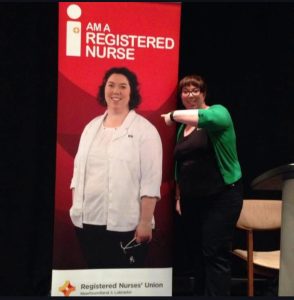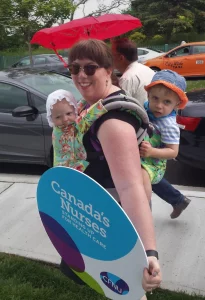Jessica Dwyer Milley: A Neurology Nurse’s Story of Advocacy and Action
May 23, 2025
Personal and Professional Background
1. How long have you been a nurse?
I graduated in 2008, so 17 years this year—I think. That sounds older than I feel.
2. Where did you complete your nursing education, and when did you graduate?
I graduated from MUN CNS in 2008. I’d also completed a B.A. in Political Science and Religious Studies, but most of that time was spent in the Breezeway and on MUN social pub crawls.
3. What inspired you to become a nurse?
All joking aside, I took a few political science courses that explored social injustice in healthcare, and it was something I became passionate about. My mother is also a Registered Nurse and worked in Mental Health for most of her career. She loved her job and the staff at the Waterford Hospital, and always spoke passionately about her work—that was a big influence too. My original plan was to graduate and work for Doctors Without Borders/Médecins Sans Frontières.
Current Role and Work Experience
4. Where do you currently work, and what is your role there?
I work for Newfoundland and Labrador Health Services, Eastern Urban, in the Neurology Department at the Health Sciences Centre. I’m the Movement Disorders Coordinator. Movement disorders include neurological diseases like Parkinson’s, Huntington’s, and neuromuscular conditions such as ALS and Myasthenia Gravis.
I help patients navigate the healthcare system—things like medication enrolments, allied health consults, referrals to specialists, counselling, and program development. I also coordinate advanced Parkinson’s therapies, including Deep Brain Stimulation consults to out-of-province centres, Duodopa (an intestinal gel form of levocarb), and Vyalev, a new subcutaneous levocarb pump.
I share some responsibilities with the MS Coordinator—like migraine drug enrolment—and assist neurologists with various procedures: Botox/Neurotoxin clinics, lumbar punctures, Baclofen challenges, and pump refills.

5. Can you walk me through a typical day in your role?
There is no typical day. I could be assisting with a lumbar puncture one minute, then helping a patient navigate a new ALS diagnosis the next. A lot of my role involves system navigation—especially for patients outside the Eastern Urban zone, where healthcare providers aren’t on the same documentation system. It’s like looking people up in the Yellow Pages until you find the right contact. (Yes, I’m dating myself!)
6. What do you enjoy most about your current area of nursing?
I really enjoy neurology. I’ve made amazing nursing friends across the country—we’re all “Neuro Nerds.” I love attending conferences because they recharge my passion for nursing. We all need that sometimes.
7. What are the biggest challenges in your current role?
It can be overwhelming. I bring a lot of the emotional weight home. It’s hard to switch off the mental “to-do list” and focus on home life. Receiving a new diagnosis—especially when the patient is young—can be heartbreaking.
8. Have you worked in other areas of nursing before? If so, how do they compare to your current work?
Mostly neurology, though I briefly worked in women’s health as a staff nurse. At the time, I had two small babies at home, and there wasn’t enough separation between home and work life—so I returned to neurology.
Union Involvement
9. What position(s) do you hold within your branch or the union?
I’ve been involved with the union since the start of my career—as a shop steward, Branch Secretary, Branch President, and Board of Directors member.
10. Why did you get involved with the Registered Nurses’ Union of Newfoundland and Labrador?
Honestly, my mentor brought me to a meeting because we were looking for funding to attend a neurology nurses’ conference. They asked for volunteers at the branch meeting, I raised my hand—and I’ve been involved ever since.
11. What’s one thing you’ve learned since becoming involved with RNU?
Each area of nursing has different challenges, but we’re all in this together. It’s not a competition over who has it worse.
12. What advice would you give to nurses who are thinking about getting involved in the union?
Do it. The leadership skills, public speaking experience, and national conferences are incredible. But the best part is the friendships—I’ve made lifelong friends through the Union. It’s made me a better nurse. I now have connections all over the province, which helps with patient care. Need an SLP in a rural community? I’ll reach out to Luke or Jill or someone I met through the Union. Dealing with a workplace issue? Maybe I remember Bill speaking at convention about the same thing—I’ll call him for advice.

Professional Impact and Growth
13. How has your involvement with RNU influenced your career?
(See above.)
14. Have you participated in union initiatives (e.g., committees, negotiations)? If so, what was your experience like?
Every role brought new experiences.
As a shop steward, I learned to think on the spot—nurses come with collective agreement questions daily, so you need to know your stuff. Supporting a member in a difficult meeting with managers? You learn to navigate those situations and when to call RNU head office for support.
As Branch Secretary, I developed great organizational skills. Technology has changed so much over the past 15 years, and keeping members engaged is a moving target.
Being Branch President taught me time management (I had two small kids and worked full-time shifts!) and how to advocate for our members.
15. What do you think are the biggest issues facing nurses today, and how can the union help address them?
Burnout. The public is frustrated by the system, and nurses are the frontline faces. It’s hard to keep your head up when you’re trying to improve care, but red tape keeps getting in the way. That’s disheartening—especially when it impacts patients.
Memorable Experiences
16. Can you share a favourite memory from your nursing career?
Thankfully, I have lots: singing with coworkers to distract a patient during a tough procedure, hugs from patients and families, washing someone’s hair and seeing how much better they feel, every laugh with coworkers, mini dance parties to boost morale on hard shifts.
17. What has been the most rewarding aspect of being a nurse?
When a patient sees you, smiles, squeezes your hand, and says, “Thank God you’re here.”
18. What has been the most challenging part of your career?
Trying not to burn out. And trying to make a system work better for your patient.
Advice and Aspirations
19. What advice would you give to someone considering a move to your area of nursing?
Neurology is awesome. You’ll develop strong nursing skills and have great experiences with your team. Get involved with your union or national nursing group—it expands your network. I have nursing friends from coast to coast who listen, offer advice, and truly get it.
20. If you could change one thing about your workplace or role, what would it be?
I’d love another nurse in my role, and more support for our other neurology nurse. Our department has expanded, but nursing support hasn’t. Neurology is a specialty where we rarely discharge patients—many conditions are degenerative and lifelong, so needs only increase. That means more mobility aids (often bulky), in a hospital over 50 years old. We need updated infrastructure: wider doorways, less hallway clutter.
21. What changes or improvements would you like to see in healthcare or nursing in Newfoundland and Labrador?
Patients often delay accepting help—like home care or ramps—until they really need it, but by then, the wait is long and frustrating. As healthcare professionals, patients, and family members, we need to take a proactive approach and prepare for aging.
Personal Reflection
22. What makes you proud to be a nurse?
When patients tell me they’re doing well—and that I helped—it makes me proud. I’m also proud when a process I helped improve leads to better patient care.
23. How do you see your career evolving in the next few years?
I’m a hardcore Neuro Nerd—so definitely attending and maybe even presenting at national conferences. I’d love to work up the nerve to present at NLHS’ nursing research day one of these years.